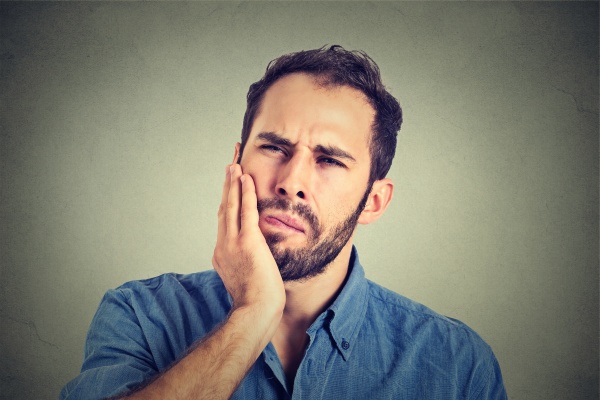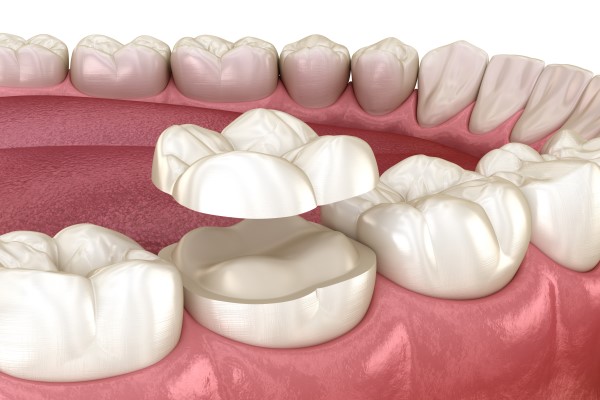My Tooth Hurts When I Bite Down: What Should I Do?

There is nothing normal about experiencing tooth pain when you bite down on food. This is usually a sign of a serious dental issue. Waiting too long to get treatment will only make the situation worse in the long run. Fortunately, we can offer treatment. The first step is to watch out for signs that something is wrong. Here is a look at some important things you should know when you persistently experience pain while chewing.
Why your tooth hurts when you bite down
The pain associated with tooth sensitivity varies in severity. It can be anything from a dull throbbing sensation, to piercing pain that one is not able to ignore. Common reasons why teeth can become sensitive include:
- Receding gums
- Damaged enamel
- Worn out fillings
- Cavities
- TMJ disorders
When the enamel of a tooth root wears away, the enamel protecting the dentin becomes exposed to all the irritants in the person's mouth like saliva, food particles and bacteria. The nerves and pulp of a tooth can also become exposed to these irritants if tooth decay is left unaddressed.
What you need to know
When the dentin becomes exposed, most people experience pain when they bite down on foods, particularly hard foods or items with extreme temperatures. Tooth sensitivity can also be a result of certain bad habits like grinding your teeth or eating too many acidic foods. Removing acidic foods like coffee, citrus foods or sugary foods from your diet can help to reduce tooth sensitivity.
Grinding your teeth is a little harder to stop since it's typically the result of some underlying psychological or health issue. Fortunately, a mouth guard can be used to minimize the damaging effects of teeth grinding. Other things that can lead to sensitive teeth that experience pain when you eat include brushing too hard, eating too many hard foods or using low-quality teeth whitening products.
How tooth pain leads to more serious issues
Experiencing pain when you bite down on things is a sign you already have a damaged tooth. It does not stop there though. If the patient does not address this damage, it will eventually lead to even more serious issues like infections, cracks, fractures and even the total loss of the tooth.
In general, the longer a person waits before addressing dental issues, the more expensive it will be to fix. Bacterial infections are particularly dangerous since the infection can eventually make its way to the bloodstream. From there, the infection can spread to other areas of the body, like the brain. The result can be fatal if the patient does not deal with the infection.
Temporomandibular Joint Disorder and sensitive teeth
Experiencing pain while you bite down can also be the result of a temporomandibular joint disorder. These are the joints that connect your jaw to the rest of your skull. When these joints become inflamed, pain while biting down is one of the symptoms.
What to do when you experience pain while chewing
Regardless of the reason why your teeth hurt when you bite down, the best thing you can do is head to a dentist's clinic as soon as possible. A dentist will advise you on the best way to deal with the underlying issue. The sooner that issue is dealt with, the quicker you can go back to eating your favorite foods and being pain-free.
Want to learn more about tooth sensitivity? Contact one of our dentists today for more information or to schedule an appointment.
For more information or to schedule an appointment with Palm Beach Dentistry, request an appointment in our Delray Beach dental office here: https://www.palmbeachdentistry.com. Or call us at (561) 225-2057.
Recent Posts
Having a dental X-ray is essential at a dental checkup to find decay and other teeth issues. Managing and diagnosing different conditions often happens with an X-ray. The dentist can use the X-ray if it is hard to detect the problems with a simple visual exam. The X-ray can take images of the jaw, tooth…
Patients might have a dental checkup to see if there are any cavities. While looking for holes is a big part of the appointment, it is not the only thing dentists look for. They can also locate gum disease and other oral health concerns. Continue reading to learn what techniques the dentist will use.A comprehensive…
Dental checkups are a common way of preventing gum disease and cavities. Not every visit is the same, but knowing what to expect can help you better understand the process. Your dentist will go over your medical history during the appointment. That way, the dentist can think about family conditions that might affect your oral…
Every six months, you should have a dental checkup. During each visit, a hygienist cleans the patient’s teeth. Then, a dentist looks for any potential or existing problems. The main goal is to correct an issue before it worsens. That way, you enjoy healthy teeth and gums from one appointment to the next. Keep reading…


